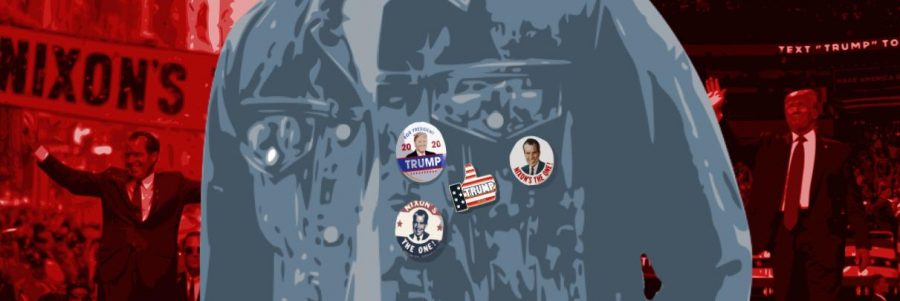1968 and Nixon Might Tell Us About 2020 and Trump
October 9, 2020
At face value, Donald Trump’s 2020 presidential campaign draws many parallels to Richard Nixon’s in 1968. Both years were marked by civil rights movements, sparked by the assassination of Martin Luther King in 1968 and the death of George Floyd at the hands of police brutality in 2020. Like today, 1968 saw a deep partisan divide over racial equality, and both candidates have run on platforms of ending uprisings and unrest. While similarities in history between the two campaigns may be coincidental, the strategies that both the past and current nominees are using are undoubtedly similar. The current administration is well aware that building a reelection strategy incorporating the successes of the 1968 election could lead to a victory, just as Nixon achieved half a century ago.
The political landscape of the mid to late 1960s mirrors what we are seeing today: a rapidly shifting political landscape, marked by divisive change in the scope of civil rights, and a conservative party seeking to resist, and reestablish the status quo. Trump has mimicked Nixon’s playbook and ran with it, championing “law and order,” in an attempt to appease the racial anxieties of white voters. Like Nixon, Trump’s promise of law and order is full of racial undertones and dog-whistles. Shortly after his nomination, Nixon openly aligned himself with the “non-shouters,” “non-demonstrators,” and against the “narcotics peddlers who are corrupting this country.” Trump has similarly undermined movements such as Black Lives Matter, demonized protestors, and fabricated an enemy in Antifa. However, despite Trump’s best efforts to emulate Nixon’s successes, his own cavalier attitude may cost him his chances of reelection.
Unlike Nixon’s successful 1968 campaign, Trump’s appeal to the middle ground and undecided voter is marginal, in part due to his rhetoric. For example, when asked what he thought about protests, Trump tweeted a quote from former Philadelphia police chief and overt racist Frank Rizzo, “When the looting starts, the shooting starts.” Despite Trump’s best efforts to be like him, inciting violence when Nixon won his appeal as a mediator wins favorability only with the most ardent of the right. Trump fails to uphold the same respect and commitment to progress that Nixon did. In a sense, he has isolated himself from normal conservatism, refusing to validate or even respect the views of the other side. Trump’s refusal to recognize protestors, and insistence on focusing his appeal on the deep right makes his role in this potential repeat of history similar to the runner-up and outright segregationist George Wallace instead. In a sense, by fulfilling this role, Trump has left a space open for someone else to be the Nixon, and campaign rival Joe Biden is the perfect fit.
The 1968 election was won by the more accessible candidate to both sides. Nixon—through statements such as, “Just as we cannot have progress without order, we cannot have order without progress,”—was able to capture the hearts of both people wishing to go back to a more “normal” America as well as give hope to those who wished for change. While Trump is failing at this role, Democratic nominee Joe Biden is doing exactly this, invoking memories of stability during the Obama administration and choosing carefully where to place support, sometimes to a fault. However, Biden avoids the pitfall of completely alienating one side of the political spectrum, just as Wallace and now Trump have done. Biden’s seemingly fairweather attitude towards the grievances of both sides might be frustrating, but the promise of a return to normalcy from the disaster of a previous administration won Nixon the presidency, and will push Biden past Trump in November.











